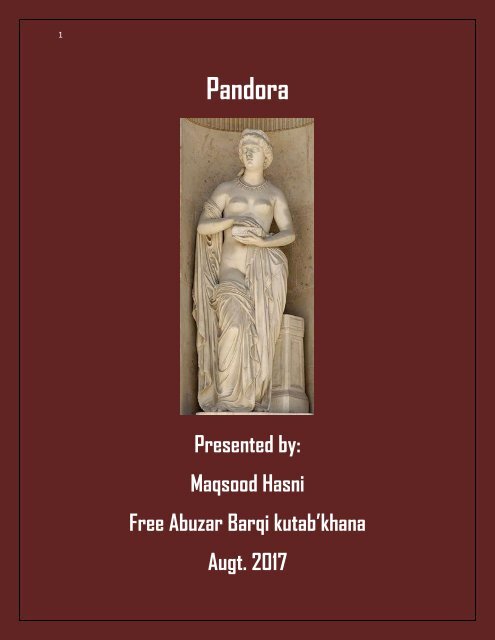pandpra
Create successful ePaper yourself
Turn your PDF publications into a flip-book with our unique Google optimized e-Paper software.
1<br />
Pandora<br />
Presented by:<br />
Maqsood Hasni<br />
Free Abuzar Barqi kutab’khana<br />
Augt. 2017
2<br />
Pandora<br />
Pandora (1861) by Pierre Loison (1816–1886)<br />
In Greek mythology, Pandora (Greek: Πανδώα,<br />
derived fro ᾶν, pā, i.e. "all" ad δῶον,<br />
dōron, i.e. "gift", thus "the all-endowed", "the<br />
all-gifted" or "the all-giving") was the first<br />
human woman created by the gods,<br />
specifically by Hephaestus and Athena on the<br />
instructions of Zeus. As Hesiod related it, each<br />
god helped create her by giving her unique<br />
gifts. Zeus ordered Hephaestus to mold her<br />
out of earth as part of the punishment of<br />
humanity for Prometheus' theft of the secret<br />
of fire, and all the gods joined in offering her<br />
"seductive gifts". Her other name—inscribed<br />
against her figure on a white-ground kylix in
3<br />
the British Museumis Anesidora, "she who<br />
sends up gifts" (up implying "from below"<br />
within the earth).<br />
According to the myth, Pandora opened a jar<br />
(pithos), in modern accounts sometimes<br />
mistranslated as "Pandora's box" (see below),<br />
releasing all the evils of humanity—although<br />
the particular evils, aside from plagues and<br />
diseases, are not specified in detail by<br />
Hesiod—leaving only Hope inside once she<br />
had closed it again<br />
The Pandora myth is a kind of theodicy,<br />
addressing the question of why there is evil in<br />
the world.<br />
https://en.wikipedia.org/wiki/Pandora
4<br />
Pandora's Box - origins<br />
What type of myth is this?<br />
Zeus<br />
Zeus wishes to punish mankind<br />
Pandoras box is an origin myth – the attempt<br />
to explain the beginning of something.<br />
People have always wanted to know why<br />
things happen in the world the way they do.<br />
Before there was much science, they did not<br />
have much understanding of how the world<br />
works, but they still wanted to know, just as
5<br />
much as we do. Human curiosity always asks<br />
why .. and then human creativity finds ways of<br />
giving an answer.<br />
There are many myths, across all cultures,<br />
which attempt to explain the beginnings of<br />
human beings and why there are evil things<br />
like disease, hate and war in the world. In<br />
many stories, these evils are released because<br />
humans disobey gods.<br />
You may like to compare the story of Pandora<br />
with the story of Adam and Eve. Do you know<br />
any other similar stories from other cultures?<br />
Are there other versions of the story?
6<br />
Pandora<br />
Pandora Creation<br />
The story of Pandora and her box comes from<br />
Ancient Greece and is very old. Because of<br />
this, there are several versions of the myth.<br />
In Greek mythology, Pandora (meaning<br />
all-giving) was the first woman on earth.<br />
Before humans there were the immortals (the<br />
Gods and Titans). The brothers, Prometheus
7<br />
and Epimetheus were Titans (Giant people)<br />
who had fought on the Gods side in a war.<br />
Some say they were cousins of Zeus, king of<br />
the gods; he asked Prometheus to create man<br />
out of clay and water (in many versions<br />
Hephaestus helps in this). Epimetheus had to<br />
create the animals and give them their gifts of<br />
courage, swiftness etc. He gave out all the gifts<br />
and had none left for Man. So Prometheus<br />
decides to make man stand upright, like the<br />
gods, and give them fire (which Zeus did not<br />
want them to have – some say he had<br />
removed it as a punishment). So Prometheus<br />
stole fire – some say from Zeus lightning,<br />
others from the sun and yet others from<br />
Hephaestus forge.<br />
Most agree that Zeus asked Hephaestus to<br />
make Pandora (the first woman) also out of
8<br />
earth and water, and he intended her to be a<br />
punishment. Each god and goddess gave<br />
Pandora a gift (talent), of beauty, charm,<br />
music etc but also others, like curiosity and<br />
persuasion – gifts that could be used for good<br />
or ill.<br />
Then Pandora was given a container – in the<br />
original Greek stories it was a jar and did not<br />
become a box until the Sixteenth century AD.<br />
A scholar called Erasmus, who lived in<br />
Rotterdam in Holland, translated a story of<br />
Pandora from Hesiods work. Hesiod was a<br />
Greek poet who lived about 700BC. Erasmus<br />
was translating the Greek into Latin (which<br />
scholars did all their writing in, in those days)<br />
and translated the Greek word pithos<br />
meaning jar into the Latin word pyxis<br />
meaning box. And a box it has stayed to this
9<br />
day!<br />
How did the myth arise?<br />
Pandora's Jar<br />
Originally a Jar?<br />
It arose as a way of explaining why dreadful<br />
things happened, such as people getting sick
10<br />
and dying.<br />
As in many origin myths, man had lived in a<br />
world without worry – until this jar / box was<br />
opened, which contained ills for mankind.<br />
Zeus knew that Pandoras curiosity would<br />
mean that she could not stop herself from<br />
opening it, especially when he had told her<br />
that she must not do so!<br />
Many other myths also explain the ills of the<br />
world by saying they are caused by human<br />
disobedience of a gods instructions.<br />
(Though some versions of this story say that<br />
the box was a real gift and the box held good<br />
things for mankind, which Pandora let escape<br />
from the box, and fly away forever, only<br />
catching Hope.)<br />
Even Hope itself has been argued about by
11<br />
scholars – not everyone agreeing that it is a<br />
great good – that maybe Zeus meant it as an<br />
evil also – otherwise it would not have been in<br />
a jar of evil. Others believe that Zeus may have<br />
relented a little, and put Hope in to help<br />
mankind through the hard times that the<br />
other gifts would bring.<br />
What does it mean to us today?<br />
Pandora's Box<br />
Today, Pandoras box means a source of<br />
troubles. When we talk about opening<br />
Pandoras box, we use it as a metaphor to<br />
mean that we may not know what we are
12<br />
getting ourselves into! Sometimes, that we do<br />
not always know how something we have<br />
started may end, that we do not know the<br />
consequences of our actions.
13<br />
Pandora<br />
Definition<br />
By Mark Cartwright<br />
Published on 27 July 2015 Pandora<br />
(Lawrence Alma-Tadema)<br />
Pandora is a figure from Greek mythology who<br />
was not only the first woman, but --as an<br />
instrument of the wrath of Zeus-- was held<br />
responsible for releasing the ills of humanity<br />
into the world. Pandora was also an unrelated<br />
earth goddess in the early Greek pantheon.<br />
PANDORA - AN INSTRUMENT OF PUNISHMENT<br />
The name Pandora means "gifts" and "all".<br />
According to (and perhaps even invented by)<br />
Hesiod in his Theogony and Works & Days,
14<br />
Zeus had Hephaistos make Pandora, the first<br />
woman, from earth and water. Zeus intention<br />
was to use the beautiful and lovely Pandora as<br />
a means to punish Prometheus who had<br />
stolen fire from the gods and given it to<br />
mankind, who would in turn be punished.<br />
Zeus promises:<br />
Son of Iapetus [Prometheus], you who know<br />
counsels beyond all others, you are pleased<br />
that you have stolen fire and beguiled my<br />
mind – a great grief for you yourself, and for<br />
men to come. To them I shall give in exchange<br />
for fire an evil in which they may all take<br />
pleasure in their spirit, embracing their own<br />
evil. (Works & Days, 54-59)<br />
PANDORAS DIVINE GIFTS<br />
Before her departure, Pandora was given a<br />
range of divine gifts by each of the Olympian
15<br />
gods. Athena taught her all the fine crafts and<br />
dressed her in silvery robes, Aphrodite gave<br />
her grace and the means to create burning<br />
desire, and Hermes gave her "a dogs mind<br />
and a thievish character" and in her breast<br />
"set lies and guileful words" (Works & Days,<br />
67-68, 77-78). If that was not enough, she was<br />
adorned with fine jewellery by the Graces,<br />
crowned with a magnificent golden headband<br />
made by Hephaistos, and given garlands of<br />
spring flowers by the Seasons. Finally, Pandora<br />
was given a large storage jar to take down to<br />
earth which she was told she must never open<br />
under any circumstances.<br />
FULFILLING HER DESTINY, CURIOSITY GOT THE<br />
BETTER OF PANDORA AND SHE LIFTED THE LID<br />
OF THE STORAGE JAR WHICH RELEASED ALL<br />
THE EVILS OF THE WORLD.
16<br />
PANDORA'S BOX: THE EVILS OF THE WORLD<br />
Pandora, guided by Hermes, was sent to<br />
Epimetheus, the brother of Prometheus.<br />
Foolishly forgetting his brothers advice never<br />
to accept a gift from the gods, the beautiful<br />
Pandora was made welcome in Epimetheus<br />
home and the two married, having a daughter,<br />
Pyrrha. One day, and fulfilling her destiny,<br />
curiosity got the better of Pandora and she<br />
lifted the lid of the storage jar which released<br />
all the evils of the world. These terrible things<br />
included disease, war, vice, toil, and the<br />
necessity to work for sustenance.<br />
Pandora, realizing her mistake, quickly<br />
replaced the lid but it was too late and only<br />
one thing remained inside, caught in the edge<br />
of the jars lip --Hope-- so that humanity might<br />
somehow bear its sudden and eternal
17<br />
misfortune.<br />
"Hope" is the traditional translation from the<br />
Greek but actually may be better represented<br />
by "anticipation" which includes an<br />
expectation of both good and bad events.<br />
Through this punishment Zeus thus<br />
compensated for the theft of fire and restored<br />
the eternal division between gods and<br />
humans.<br />
PANDORA IN ART
18<br />
A relief frieze showing the birth of Pandora<br />
appeared on the statue base of the gigantic<br />
Athena Parthenos by Pheidias which stood<br />
inside the Parthenon. According to Pliny the<br />
scene included 20 gods looking on. Pandora
19<br />
appears too on a few Attic vases in scenes<br />
probably inspired by the now lost satyr play<br />
Pandora by Sophocles.<br />
In one 5th century BCE red-figure krater, now<br />
in the Ashmolean Museum Oxford, Pandora<br />
emerges from the ground, symbolizing her<br />
origin from clay. In such scenes either<br />
Epimetheus or satyrs hold mallets but the<br />
significance of these has, unfortunately, been<br />
lost and they once more illustrate the richness<br />
of Greek mythology beyond the surviving<br />
literary sources.<br />
http://www.ancient.eu/Pandora/
20

















